Plain Jane
Just Plain Jane
With Elections Looming, Taiwan Battles Massive Cyber Threat: Cybersecurity Expert | ZeroHedge
ZeroHedge - On a long enough timeline, the survival rate for everyone drops to zero
With Elections Looming, Taiwan Battles Massive Cyber Threat: Cybersecurity Expert
BY TYLER DURDEN
TUESDAY, JAN 02, 2024 - 01:25 PM
Authored by Venus Upadhayaya via The Epoch Times (emphasis ours),
With Taiwan’s elections just two weeks away, concerns about Chinese interference in the elections have become more prominent.
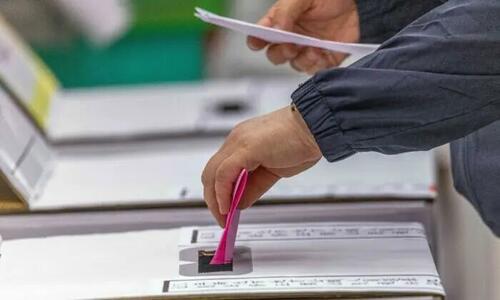 A man votes in New Taipei City, Taiwan, on Nov. 26, 2022. (Annabelle Chih/Getty Images)
A man votes in New Taipei City, Taiwan, on Nov. 26, 2022. (Annabelle Chih/Getty Images)The Chinese Communist Party’s (CCP’s) fourth-ranking leader, and its lead in charge of Taiwan affairs, Wang Huning, convened a meeting of various departments in late November to discuss CCP influence operations in Taiwan. A senior Taiwanese security official shared news of the meeting with a group of selected media earlier this month, according to CNN.
A scholar from Taiwan’s Institute of National Defense and Security Research told The Epoch Times in an exclusive interview that the CCP’s agenda for manipulating the January elections has turned Taiwan into the “most dangerous place in cyberspace.”
“With fast developments in AI tools, new types of malicious software, [and the] criminal chain of Ransomware as a Service [RaaS], Taiwan is suffering from more diverse cyber attacks,” according to Wu Tsunghan, an assistant research fellow with the institute.
Mr. Wu shared his viewpoints in a conference jointly organized by New Delhi’s Jawaharlal Nehru University and the Taiwanese mission on Dec. 9. He reminded the gathering that Taiwanese businesses were attacked 3,245 times every week on average in the first half of 2023.
Overall, 15,000 cyber threats were detected every second during the same period, making Taiwan the most attacked location in Asia-Pacific cyberspace, according to Fortinet, a U.S. cybersecurity firm.
Meanwhile, the Taiwanese security expert told reporters that Mr. Wang, who became head of Taiwanese affairs earlier in 2023, has instructed officials to “step up their effectiveness” in influencing Taiwan’s public opinion, ahead of the Jan. 13 elections.
A longtime advisor to CCP head Xi Jinping, who personally chairs China’s Central Leading Group for Taiwan Affairs, Mr. Wang also acts as the deputy head of the group. He directed his staff to reduce any likelihood of external parties uncovering evidence of CCP interference in Taiwan, according to reports.
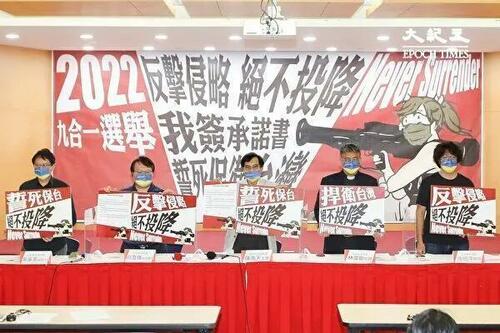 Representatives of Taiwanese civic organizations call on all candidates for the November nine-in-one elections to sign the "Defend Taiwan and Never Surrender" pledge, in a joint press conference in Taipei on Sept. 5, 2022. (Shih-chieh Lin/The Epoch Times)
Representatives of Taiwanese civic organizations call on all candidates for the November nine-in-one elections to sign the "Defend Taiwan and Never Surrender" pledge, in a joint press conference in Taipei on Sept. 5, 2022. (Shih-chieh Lin/The Epoch Times)Disinformation Campaign
Mr. Wu said that Chinese meddling in Taiwanese elections most importantly includes “making confusion” by stirring up society. As an example, he cited a cyber incident in which a Dec. 6 social media post accused the Taiwanese government of monitoring the Taiwanese public.“Is it true or not? How to verify? Who can verify? Can the verification be trusted?” said Mr. Wu during the conference.
He noted that the Chinese regime tries to use information to influence people’s minds and behavior.
“If true, it refers to [a] data leak [from] government agencies. If not true—Why at this time? Who’s operating it?” he said, adding that the purpose can be to undermine public trust in the government.
He gave the example of another disinformation campaign that accused the Taiwanese government of wanting to import Japanese nuclear waste to Taiwan.
Disinformation is spread through the Chinese-speaking world by social media platforms popular in Taiwan such as Facebook, which shared images and false information from Chinese platforms like Weibo or Douyin, according to a report by the Taiwan FactCheck Center (TFC).
“Nonetheless, while Chinese narratives attempted to feed increasing anti-Japan sentiment in China, Taiwanese ones exploited Taiwanese citizens’ long-standing concern about food safety and criticized the government led by the Democratic Progress Party (DPP) for being soft on Japan,” said the Sept. 18 report authored by Wei-Ping Li.
An erroneous narrative circulating in Taiwan concerned Yasuhiro Sonoda, a Japanese politician who was said to have died from multiple myeloma in 2020 because he drank treated wastewater from the Fukushima nuclear power plant.
“This rumor has persisted in social media like Weibo, Douyin, Facebook, and LINE, for years and has lately become prevalent again. It wasn’t until this September that Kyodo News was able to contact Mr. Sonoda confirmed he was still alive,” said the TFC report.
Something similar happened during the visit of Taiwanese vice-president, Lai Ching-te, to Paraguay in August to attend the inauguration of Paraguayan President Santiago Peña Palacios.
Paraguay is part of a dwindling group of governments—currently only 12—that continue to have diplomatic relations with Taiwan. Mr. Peña had visited Taiwan in July and had promised President Tsai Ing-wen that his country would “stand with the people of Taiwan” during his five-year term.
Mr. Wu said a fake news report began circulating claiming that Taiwan was going to provide funding to build free housing for Paraguay.
“Sometimes providing funding to other countries … some people might [wonder why] Taiwan is providing funding to other countries when we are facing such challenges as high house prices and [when] the salary is not good,” he said, adding that this bit of misinformation directly targeted the reputation of the Taiwanese government, as well as its relationship with Paraguay.
According to Mr. Wu, such “disinformation campaigns” accelerate during times like the visit of top Taiwanese leaders to the United States and vice-versa, and during national elections.
“It really depends upon the context, purpose, and what kind of goal the attackers want to achieve,” he said. It’s difficult to find the source of disinformation campaigns like this, and by the time it is uncovered, it has already made an impact on the public and cast doubt on Taiwan’s democratic system of government.
Chinese meddling in Taiwanese elections also came up during Xi’s visit to San Francisco for the Asia-Pacific Economic Cooperation summit in November. After his meetings with the Chinese leader, President Joe Biden told reporters on Nov. 16 that he had discussed the matter with the Chinese leader.
“I made it clear: I didn’t expect any interference, any at all. And we had that discussion as—as he was leaving,” Mr. Biden said.
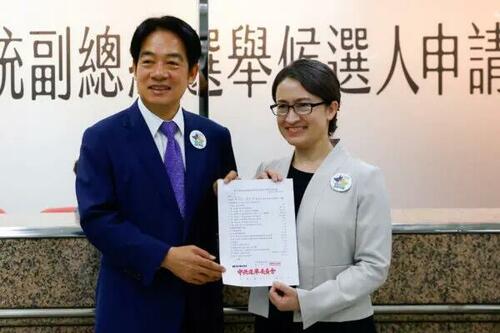 Taiwan's Vice President Lai Ching-te and running mate Hsiao Bi-Khim pose for a photo after registering for the upcoming presidential election at the Central Election Commission in Taipei, Taiwan, on Nov. 21, 2023. (Ann Wang/Reuters)
Taiwan's Vice President Lai Ching-te and running mate Hsiao Bi-Khim pose for a photo after registering for the upcoming presidential election at the Central Election Commission in Taipei, Taiwan, on Nov. 21, 2023. (Ann Wang/Reuters)The SSF and Base 311
China’s cyberwar operations against Taiwan, which are currently at their peak, are managed by the People’s Liberation Army Strategic Support Force (SSF), and Base 311, a unit based in Fujian that focuses on Taiwan, Mr. Wu said.According to Mr. Wu, Base 311 has its own media company. Dedicated to the implementation of the “Three Warfares” strategy—public opinion or media warfare, psychological warfare, and legal warfare—it creates an ecosystem that feeds media in Taiwan. Base 311 has at least six regiments overseeing the three types of warfare, as well as multiple forms of propaganda.
The latter is fed by China Huayi Broadcasting Corporation (CHBC), which the Global Taiwan Institute defines as Base 311’s commercial front.
“Its coverage of Taiwan is routinely negative, often highlighting political contention and social issues,” according to a 2017 report by the Washington-based non-profit.
Mr. Wu said China’s propaganda operations against Taiwan are encompassed by its “cyber approach” which he described as one of the means of “PLA invasion.”
“Cognitive warfare and disinformation integrates cyber, information, psychological, and social engineering attacks, and can operate in synchronization with other physical means aiming to affect attitudes and behavior of the targeted individual or group to gain advantage,” said Mr. Wu, adding that this cyber approach has been the crux of China’s pre-election influence operations.



 The MI6 building in London, via Reuters
The MI6 building in London, via Reuters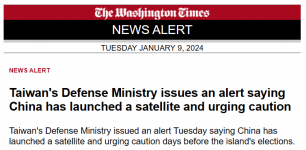











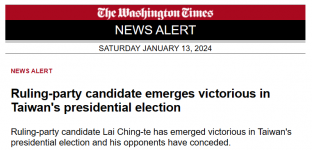

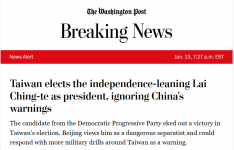
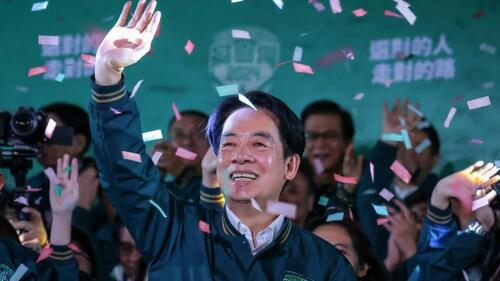 Lai was ahead of his two opponents by a comfortable margin, Getty Images
Lai was ahead of his two opponents by a comfortable margin, Getty Images
